Читать книгу From Reopen to Reinvent - Michael B. Horn - Страница 19
It's Not Just Bad for the Jeremys of the World
ОглавлениеPeople's typical perception is that the schooling system won't change because those who come from well-off families benefit from it. Although there's some truth to that, the system doesn't work well for students from privileged backgrounds either.
For students like Julia, who has lots of resources outside of school, we leave a lot to chance. How is an elementary school student with busy parents to know what digital resources to trust or which ones are reliable or safe? Social media and search engines expose individuals to lots of questionable information.
A long summer break probably doesn't work for Julia. She crams a bunch of her interests into the break instead of spreading them throughout the year. Why is this negative? Instead of modeling a balanced lifestyle, it pits academics, athletics, arts, and other areas of passion against each other.
It also doesn't work for her busy parents as they figure out in which camps to enroll Julia and how to make the schedules work with their demanding jobs—to say nothing of the expenses and stress they incur as they try to make sure Julia won't “miss out” on any opportunity. It will also force Julia to load up on what she's doing during the school year, which creates significant stress.7 Creating a more flexible, balanced, year-round calendar wouldn't take anything away from Julia. She and her parents could ideally still take breaks when it made sense for them. But it could improve her baseline.
That speaks to the second bucket. Although it's likely that given Julia's family background and her resources she will perform well enough in school, that doesn't mean that she finds school engaging. She's likely bored. She may be stressed soon, too. Odds are her focus will be all around “getting by,” but it's unlikely she finds that school speaks to her or how she learns. Witness the numbers of second-semester seniors in high school who stop trying once they figure out which college they will be attending. It's also likely that Julia will graduate without a real sense of what she cares about or different pathways she could carve out for herself after high school ends. Even worse, many Julias graduate high school burned out and feeling like a failure after being rejected by the dozens of selective colleges to which they apply. One student we spoke to for my book Choosing College said he felt like he had “had a midlife crisis” after his dream school rejected him. He was 18 at the time.
This speaks to the final set of reasons why today's schooling system doesn't work for the Julias of the world. Spending her weekends doing test prep or extra math classes in the afternoons just to stay ahead in the rat race of rankings is exhausting. And it sends the unambiguous signal that schooling is a game to be won—not a pathway to help individuals prepare themselves for life. Although Julia might have the tools to play the game well, that doesn't mean it's a game worth playing. It's likely that once she enters middle school what she's really learning to do is constantly compare herself to others along a narrow set of measures. Nor is it likely that she's learning critical organizational or collaboration skills, let alone agency, self-efficacy, and self-direction. These are critical skills not to get in to college, but to successfully navigate college, the professional world, and her life. School is setting her up for a “real” midlife crisis.
